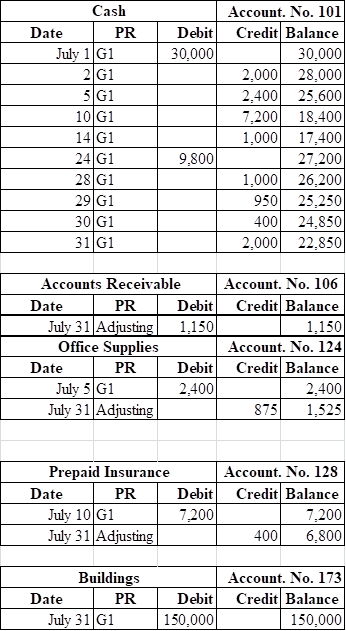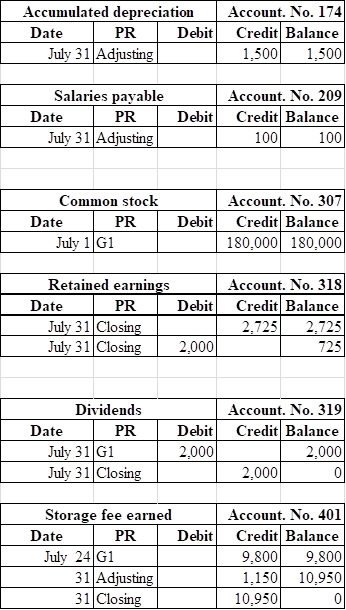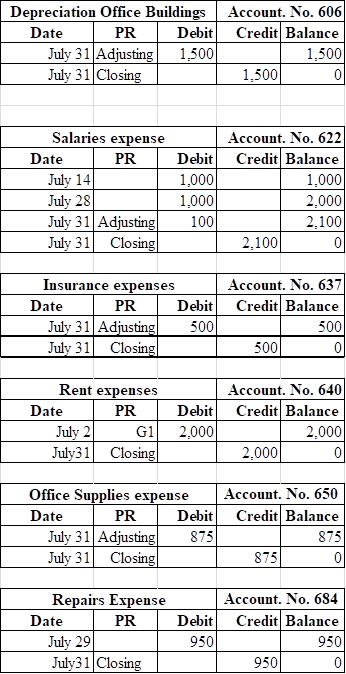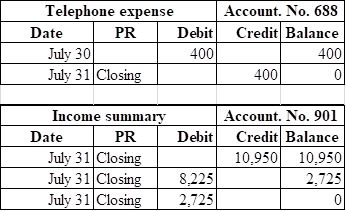
Concept explainers
2.
Prepare the journal entries to record the each of the transactions and events for Corporation SS.
2.
Explanation of Solution
Prepare the journal entries.
| Date | Account titles and Explanation | Post Ref. | Debit ($) | Credit ($) |
| July 1 | Cash | 101 | 30,000 | |
| Buildings | 173 | 150,000 | ||
| Common stock | 307 | 180,000 | ||
| (To record the common stock in exchange for cash and building) | ||||
| July 2 | Rent expense | 640 | 2,000 | |
| Cash | 101 | 2,000 | ||
| (To record the rent expense) | ||||
| July 5 | Office supplies | 124 | 2,400 | |
| Cash | 101 | 2,400 | ||
| (To record the office supplies) | ||||
| July 10 | Prepaid insurance | 128 | 7,200 | |
| Cash | 101 | 7,200 | ||
| (To record the prepaid insurance) | ||||
| July 14 | Salaries expense | 622 | 1,000 | |
| Cash | 101 | 1,000 | ||
| (To record the salaries expense) | ||||
| July 28 | Cash | 101 | 9,800 | |
| Storage fees earned | 401 | 9,800 | ||
| (To record the storage fees earned) | ||||
| July 29 | Repairs expense | 684 | 950 | |
| Cash | 101 | 950 | ||
| (To record the repairs expense) | ||||
| July 30 | Telephone expense | 688 | 400 | |
| Cash | 101 | 400 | ||
| (To record the telephone expense) | ||||
| July 31 | Dividends | 319 | 2,000 | |
| Cash | 101 | 2,000 | ||
| (To record the payment of dividends) |
Table (1)
3.
Prepare the unadjusted
3.
Explanation of Solution
Unadjusted trial balance:
The unadjusted trial balance is the summary of all the ledger accounts that appears on the ledger accounts before making adjusting journal entries.
Prepare the unadjusted trial balance as on July 31, 2015.
| Corporation SS | ||
| Unadjusted trial balance | ||
| For the year ended July 31, 2015 | ||
| Particulars | Debit($) | Credit ($) |
| Cash | 22,850 | |
| Accounts receivable | 0 | |
| Office supplies | 2,400 | |
| Prepaid insurance | 7,200 | |
| Building | 150,000 | |
| Accumulated | 0 | |
| Salaries payable | 0 | |
| Common stock | 180,000 | |
| 0 | ||
| Dividends | 2,000 | |
| Storage fee earned | 9,800 | |
| Depreciation expense, Building | 0 | |
| Salaries expense | 2,000 | |
| Insurance expense | 0 | |
| Rent expense | 2,000 | |
| Office supplies expense | 0 | |
| Repairs expense | 950 | |
| Telephone expense | 400 | |
| Totals | $189,800 | $189,800 |
Table (2)
4.
Prepare the
4.
Explanation of Solution
Adjusting entries: Adjusting entries are those entries which are recorded at the end of the year, to update the income statement accounts (revenue and expenses) and balance sheet accounts (assets, liabilities, and
Prepare the adjusting entries as on 31st July 2015.
| Date | Account titles and Explanation | Post Ref. | Debit ($) | Credit ($) |
| July 31 | Insurance expense | 637 | 400 | |
| Prepaid insurance | 128 | 400 | ||
| (To record the adjusting entry for insurance expense) | ||||
| July 31 | Office supplies expense | 650 | 875 | |
| Office supplies | 124 | 875 | ||
| (To record the adjusting entry for office supplies expense) | ||||
| July 31 | Depreciation expense-Buildings | 606 | 1,500 | |
| Accumulated depreciation-Buildings | 174 | 1,500 | ||
| (To record the adjusting entry for depreciation expense, Buildings) | ||||
| July 31 | Salaries expense | 622 | 100 | |
| Salaries payable | 209 | 100 | ||
| (To record the adjusting entry for salaries expense) | ||||
| July 31 | Accounts receivable | 106 | 1,150 | |
| Storage fees earned | 401 | 1,150 | ||
| (To record the adjusting entry for storage fees earned) |
Table (3)
5.
Prepare the adjusted trial balance as of 31st July 2015.
5.
Explanation of Solution
Adjusted trial balance:
Adjusted trial balance is a summary of all the ledger accounts, and it contains the balances of all the accounts after the adjustment entries are journalized, and posted.
Prepare the adjusted trial balance as of 31st July 2015.
| Corporation SS | ||
| Adjusted trial balance | ||
| For the year ended July 31, 2015 | ||
| Particulars | Debit($) | Credit ($) |
| Cash | 22,850 | |
| Accounts receivable | 1,150 | |
| Office supplies | 1,525 | |
| Prepaid insurance | 6,800 | |
| Building | 150,000 | |
| Accumulated depreciation, Building | 1,500 | |
| Salaries payable | 100 | |
| Common stock | 180,000 | |
| Retained earnings | 0 | |
| Dividends | 2,000 | |
| Storage fee earned | 10,950 | |
| Depreciation expense, Building | 1,500 | |
| Salaries expense | 2,100 | |
| Insurance expense | 400 | |
| Rent expense | 2,000 | |
| Office supplies expense | 875 | |
| Repairs expense | 950 | |
| Telephone expense | 400 | |
| Totals | $192,550 | $192,550 |
Table (4)
Income statement:
Income statement is a financial statement that shows the net income or net loss by deducting the expenses from the revenues and vice versa.
Prepare the income statement for the year ended 31st July 2015.
| Corporation SS | ||
| Income statement | ||
| For the three months ended July 31, 2015 | ||
| Particulars | Amount ($) | Amount ($) |
| Revenues | ||
| Storage fee earned | 10,950 | |
| Total revenue | 10,950 | |
| Expenses | ||
| Depreciation expense, Buildings | 1,500 | |
| Salaries expense | 2,100 | |
| Insurance expense | 400 | |
| Rent expense | 2,000 | |
| Office supplies expense | 875 | |
| Repairs expense | 950 | |
| Telephone expense | 400 | |
| Total Expenses | 8,225 | |
| Net income | $2,725 | |
Table (5)
Statement of Retained Earnings:
Statement of retained earnings shows, the changes in the retained earnings, and the income left in the company after payment of the dividends, for the accounting period.
Prepare the statement of retained earnings for the year ended 31st July 2015.
| Corporation SS | ||
| Statement of Retained Earnings | ||
| For the three months ended 31st July 2015 | ||
| Particulars | Amount ($) | Amount ($) |
| Retained earnings, Beginning | 0 | |
| Add: Net income | 2,725 | |
| Subtotal | 2,725 | |
| Less: Dividends | 2,000 | |
| Retained earnings, Ending | $725 | |
Table (6)
Balance sheet:
This financial statement reports a company’s resources (assets) and claims of creditors (liabilities) and stockholders (stockholders’ equity) over those resources. The resources of the company are assets which include money contributed by stockholders and creditors. Hence, the main elements of the balance sheet are assets, liabilities, and stockholders’ equity.
Prepare the balance sheet as on 31st July 2015.
| Corporation SS | ||
| Balance Sheet | ||
| As an July 31, 2015 | ||
| Particulars | Amount($) | Amount($) |
| ASSETS | ||
| Current Assets: | ||
| Cash | 22,850 | |
| Accounts receivable | 1,150 | |
| Office Supplies | 1,525 | |
| Prepaid insurance | 6,800 | |
| Total Current Assets | 32,325 | |
| Buildings | 150,000 | |
| Less: Accumulated depreciation, Buildings | 1,500 | 148,500 |
| Total assets | $180,825 | |
| LIABILITIES | ||
| Current Liabilities: | ||
| Salaries payable | 100 | |
| Total current liabilities | 100 | |
| Long-liabilities: | 0 | |
| Total liabilities | 100 | |
| Stockholders’ equity | ||
| Paid-in capital | ||
| Common stock | 180,000 | |
| Retained earnings | 725 | |
| Total Stockholders’ Equity | 180,725 | |
| Total liabilities and Stockholders’ Equity | $180,825 | |
Table (7)
6.
Record and post the necessary closing entries as of 31st July 2015.
6.
Explanation of Solution
Closing entries: The journal entries prepared to close the temporary accounts to Retained Earnings account are referred to as closing entries. The revenue, expense, and dividends accounts are referred to as temporary accounts because the information and figures in these accounts is held temporarily and consequently transferred to permanent account at the end of accounting year.
Prepare the closing entry for revenue accounts.
| Date | Accounts title and explanation | Post Ref. |
Debit ($) |
Credit ($) |
| July 31 | Storage fees earned | 401 | 10,950 | |
| Income summary | 901 | 10,950 | ||
| (To close the revenues account) |
Table (8)
In this closing entry, revenue accounts are closed by transferring the amount of revenue accounts to the income summary account in order to bring the revenue account balance to zero. Hence, debit the revenue accounts and credit income summary account.
Prepare the closing entry for expenses account.
| Date | Accounts title and explanation | Post Ref. |
Debit ($) |
Credit ($) |
| July 31 | Income summary | 901 | 8,225 | |
| Depreciation expense-Buildings | 606 | 1,500 | ||
| Salaries expense | 622 | 2,100 | ||
| Insurance expense | 637 | 400 | ||
| Rent expense | 640 | 2,000 | ||
| Office supplies expense | 650 | 875 | ||
| Repairs expense | 684 | 950 | ||
| Telephone expense | 688 | 400 | ||
| (To close the expenses account) |
Table (9)
In this closing entry, expenses account is closed by transferring the amount of expenses to the income summary in order to bring the expenses account balance to zero. Hence, debit the income summary account and credit all expenses account.
Prepare closing entry for income summary account.
| Date | Accounts title and explanation | Post Ref. |
Debit ($) |
Credit ($) |
| July 31 | Income Summary | 901 | 2,725 | |
| Retained Earnings | 308 | 2,725 | ||
| (To close the income summary account) |
Table (10)
Closing entry of income summary account:
In this closing entry, income summary account is closed by transferring the amount of income summary (profit) to the retained earnings in order to bring the income summary account balance to zero. Hence, debit the income summary account and credit retained earnings account.
Prepare closing entry for dividend account.
Date | Accounts title and explanation | Post Ref. |
Debit ($) |
Credit ($) |
| July 31 | Retained Earnings | 318 | 2,000 | |
| Dividends | 2,000 | |||
| (To close the dividends account) |
Table (11)
In this closing entry, dividend account is closed by transferring the amount of dividend to the retained earnings in order to bring the dividend account balance to zero. Hence, debit the retained earnings account and credit dividend account.
7.
Prepare the post-closing trial balance as on 31st July 2015.
7.
Explanation of Solution
Post-closing trial balance:
The post-closing trial balance is a summary of all ledger accounts, and it shows the debit and the credit balances after the closing entries are journalized and posted. The post-closing trial balance contains only permanent (balance sheet) accounts, and the debit and the credit balances of permanent accounts should agree.
Prepare the post-closing trial balance as on 31st July 2015.
| Corporation SS | ||
| Adjusted trial balance | ||
| For the year ended July 31, 2015 | ||
| Particulars | Debit($) | Credit ($) |
| Cash | 22,850 | |
| Accounts receivable | 1,150 | |
| Office supplies | 1,525 | |
| Prepaid insurance | 6,800 | |
| Buildings | 150,000 | |
| Accumulated depreciation, Buildings | 1,500 | |
| Salaries payable | 100 | |
| Common stock | 180,000 | |
| Retained earnings | 725 | |
| Totals | $182,325 | $182,325 |
Table (11)
1, 2, 4, and 6
1, 2, 4, and 6
Explanation of Solution
Post the transactions to the general ledger.




Want to see more full solutions like this?
Chapter 3 Solutions
FINANCIAL ACCOUNTING ACCT 2301 >IC<

 AccountingAccountingISBN:9781337272094Author:WARREN, Carl S., Reeve, James M., Duchac, Jonathan E.Publisher:Cengage Learning,
AccountingAccountingISBN:9781337272094Author:WARREN, Carl S., Reeve, James M., Duchac, Jonathan E.Publisher:Cengage Learning, Accounting Information SystemsAccountingISBN:9781337619202Author:Hall, James A.Publisher:Cengage Learning,
Accounting Information SystemsAccountingISBN:9781337619202Author:Hall, James A.Publisher:Cengage Learning, Horngren's Cost Accounting: A Managerial Emphasis...AccountingISBN:9780134475585Author:Srikant M. Datar, Madhav V. RajanPublisher:PEARSON
Horngren's Cost Accounting: A Managerial Emphasis...AccountingISBN:9780134475585Author:Srikant M. Datar, Madhav V. RajanPublisher:PEARSON Intermediate AccountingAccountingISBN:9781259722660Author:J. David Spiceland, Mark W. Nelson, Wayne M ThomasPublisher:McGraw-Hill Education
Intermediate AccountingAccountingISBN:9781259722660Author:J. David Spiceland, Mark W. Nelson, Wayne M ThomasPublisher:McGraw-Hill Education Financial and Managerial AccountingAccountingISBN:9781259726705Author:John J Wild, Ken W. Shaw, Barbara Chiappetta Fundamental Accounting PrinciplesPublisher:McGraw-Hill Education
Financial and Managerial AccountingAccountingISBN:9781259726705Author:John J Wild, Ken W. Shaw, Barbara Chiappetta Fundamental Accounting PrinciplesPublisher:McGraw-Hill Education





